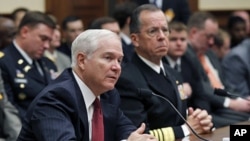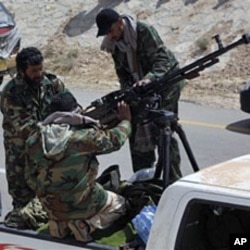Several influential congressional leaders have spoken out against the United States arming Libyan rebels, warning that too little is known about what they really stand for. Secretary of Defense Robert Gates conceded to the panel that the rebels are not a well-known or cohesive unit.
"To be honest, other than a relative handful of leaders, we do not have much visibility into those who have risen against Gadhafi," said Gates. "But I think that in a way speaking of the quote unquote opposition is a misnomer. Because it is very disparate, it is very scattered and probably each element has its own agenda."
Gates said the lack of unity and coordination is one of the Libyan rebels' biggest problems in their fight against Gadhafi's forces. He said what the rebels need most right now is training, but made clear that should not be up to the United States.
"The truth is in terms of providing that training, in terms of providing assistance to them, frankly there are many countries that can do that, that is not a unique capability for the United States and as far as I am concerned somebody else should do that," Gates said.
Admiral Mike Mullen agreed with Gates, saying it would be best if a country that is not a member of NATO would provide arms to the rebels and to give them basic training on how to use them.
Gates and Mullen faced questions from lawmakers of both major parties about why President Barack Obama did not consult with Congress earlier during his decision-making process, instead of just informing them only hours before the military action began.
"We do not understand what he is doing still, and I do not think he has the support of this Congress, but that is my personal opinion. I yield back," Miller said.
One of the few voices who spoke up in firm support of the president's handling of Libya was Democratic Congressman Jim Cooper from Tennessee, who intimated that some of the criticism of the president may be politically-motivated.
"I do not think it has been mentioned so far here today, that the Senate, the U.S. Senate, on March 1 unanimously called for a no-fly zone over Libya," Cooper said."The House did not have a similar action, but that is at least some sign of congressional involvement earlier on in this process. It is no secret that this is a period of domestic tension in this country politically, but it makes me yearn for the days when politics stopped at the water's edge and we could gather behind the commander-in-chief."
Gates added that both Republican and Democratic lawmakers in the House had also called for a no-fly zone over Libya.
Secretary Gates assured lawmakers there would be no U.S ground forces, as he put it, "no boots on the ground" as long as he holds his job.
He said the United States and the world may not know much about the Libyan opposition, but they know all too well what Libyan leader Moammar Gadhafi is capable of.
"This guy has been a huge problem for the United States for a long time. And the reason the Arab League came together, and the reason that the U.N. voted and the reason NATO has supported this is not because they know a lot about the opposition but because they know a lot about Gadhafi," Gates said. "And they know what Gadhafi was not only going to do to his own people, but his potentional for disrupting everything that is going on in the Middle East right now."
Gates said Arab countries in the region decided that Gadhafi had become a threat to them, and Britain and France were concerned about the killing of innocent people on a massive scale, and a major problem of thousands of refugees crossing the borders into Tunisia and Egypt.
He said the international coalition aims to keep the pressure on Gadhafi to prevent him from killing his own people and to prevent him from destabilizing the entire region. Gates says the United States believes military, economic and political pressure will drive Gadhafi from power.
Related video report by Meredith Buel:





